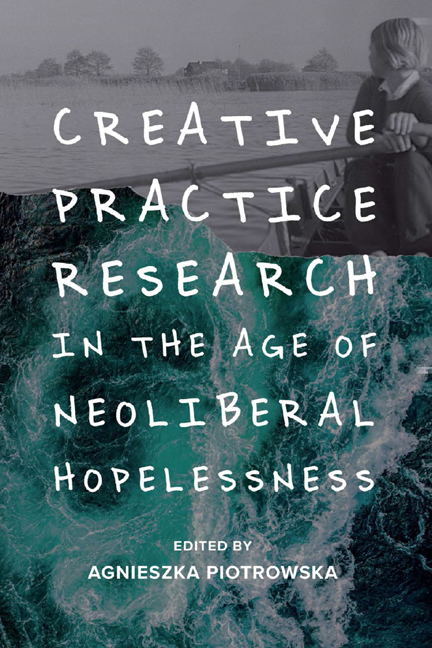Book contents
- Frontmatter
- Contents
- List of Figures
- Notes on Contributors
- Acknowledgements
- Preface: Life in the Post Pandemic Age
- Dedication
- 1 Introduction: Complexities, Compromises and Complicities
- 2 Against the Grain: Women Film Practitioners and Theorists Talk Creative Practice and Theory
- 3 Married to the Eiffel Tower: Notes on Love, Loss and Knowledge
- 4 Creativity and Neoliberalism: Between Autonomy, Resistance and Tactical Compliance
- 5 Tactical Compliance and the Persistence of Elsaesser
- 6 Storytelling and Game Playing
- 7 Autonomy and the Other Woman: Queer Active Agency and Postcolonial Expectations
- 8 From Neolithic to Neoliberal
- 9 First-person Expression on ‘Non-Western’ Screens: China as a Case Study
- 10 Scholarly Exploration of the Creative Process: Integrating Film Theory and Practice
- 11 Teaching Practice as Theory: Guerrilla Filmmaking
- 12 Baits of Falsehood: The Role of Fiction in Documentary or From Untheorised Practice to Unpractised Theory
- 13 Repented: A Creative Intersemiotic Translation
- Notes on Repented
- 14 How do you see me? The Camera as Transitional Object in Diasporic, Domestic Ethnography
- 15 ‘Shut Your Hole, Girlie. Mine's Making Money, Doll’: Creative Practice-Research and the Problem of Professionalism
- 16 Feminist ‘Pensive-creative Praxis’ and Irigaray: A Porous, Dialogical Encounter
- 17 The Paths of Creation, or How Can I Help my Dybbouk to Get Out of Me?
- 18 ‘We Want to Kill Boko Haram’: Reflections on the Photographic Representation of Children in a Displacement Camp
- 19 Between ‘Counter-movement’ (Ingold) and ‘Living with Ghosts’ (Demos)
- 20 Screen Memories: A Video Essay on Smultronstället/Wild Strawberries
- Index
13 - Repented: A Creative Intersemiotic Translation
Published online by Cambridge University Press: 17 October 2020
- Frontmatter
- Contents
- List of Figures
- Notes on Contributors
- Acknowledgements
- Preface: Life in the Post Pandemic Age
- Dedication
- 1 Introduction: Complexities, Compromises and Complicities
- 2 Against the Grain: Women Film Practitioners and Theorists Talk Creative Practice and Theory
- 3 Married to the Eiffel Tower: Notes on Love, Loss and Knowledge
- 4 Creativity and Neoliberalism: Between Autonomy, Resistance and Tactical Compliance
- 5 Tactical Compliance and the Persistence of Elsaesser
- 6 Storytelling and Game Playing
- 7 Autonomy and the Other Woman: Queer Active Agency and Postcolonial Expectations
- 8 From Neolithic to Neoliberal
- 9 First-person Expression on ‘Non-Western’ Screens: China as a Case Study
- 10 Scholarly Exploration of the Creative Process: Integrating Film Theory and Practice
- 11 Teaching Practice as Theory: Guerrilla Filmmaking
- 12 Baits of Falsehood: The Role of Fiction in Documentary or From Untheorised Practice to Unpractised Theory
- 13 Repented: A Creative Intersemiotic Translation
- Notes on Repented
- 14 How do you see me? The Camera as Transitional Object in Diasporic, Domestic Ethnography
- 15 ‘Shut Your Hole, Girlie. Mine's Making Money, Doll’: Creative Practice-Research and the Problem of Professionalism
- 16 Feminist ‘Pensive-creative Praxis’ and Irigaray: A Porous, Dialogical Encounter
- 17 The Paths of Creation, or How Can I Help my Dybbouk to Get Out of Me?
- 18 ‘We Want to Kill Boko Haram’: Reflections on the Photographic Representation of Children in a Displacement Camp
- 19 Between ‘Counter-movement’ (Ingold) and ‘Living with Ghosts’ (Demos)
- 20 Screen Memories: A Video Essay on Smultronstället/Wild Strawberries
- Index
Summary
In Edward Said's introduction to Orientalism (2003 [1978]) there is one particular scene, from the French writer Gustave Flaubert, which symbolises the encounter between the West and the subaltern, and, in broader terms, the encounter between the coloniser and the colonised. The scene features the Egyptian courtesan Kuchuk Hanem who may have been Flaubert's lover too. Said comments: ‘He was foreign, comparatively wealthy, male, and these were historical facts of domination that allowed him not only to possess Kuchuk Hanem physically but to speak for her and tell his readers in what way she was “typically Oriental”.’ Said goes on brilliantly to construct an argument, using some of Gramsci's ideas, on hegemonic forces in culture and society, ascertaining that the West/East and West/South relations at that point in time rested on a strategy of ‘flexible positional superiority, which puts the Westerner in a whole series of possible relationships with the Orient without ever losing the relative upper hand’ (ibid.: 7) (emphasis in original). Re-reading the above quote today, what is very clear, almost embarrassingly blindingly clear, is that the colonisation taking place in the encounter between the prostitute and Flaubert is not only a colonisation of a subaltern non-Western subject by a dominant Western one, but it is also, or perhaps primarily, an intra-gender encounter of an all too familiar kind: a man buying a woman, penetrating a woman, taking things from her that he needs, including her voice which he then makes his own. Said's poignant point equates in some way a woman and the subaltern in the colonial encounter: and perhaps it is also true that a non- Western woman has been the most likely object of such a colonisation.
This chapter reflects on my own practice in Zimbabwe and in particular focuses on the issue of reclaiming the voice of a subaltern woman in colonial times. I focus on my practice research, which involves the adaptation of a theatre play by the award-winning Zimbabwean playwright Stanley Makuwe into an experimental film about colonial and post-colonial gender relations in a small mining town in Zimbabwe. The play deals with the painful legacy of colonialism: a black woman is the key recipient of discrimination and subjugation on the part of white colonisers but especially also on the part of her black lover.
- Type
- Chapter
- Information
- Creative Practice Research in the Age of Neoliberal Hopelessness , pp. 183 - 196Publisher: Edinburgh University PressPrint publication year: 2020



